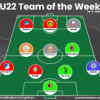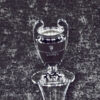Jose Miguel Saraiva writes a detailed article about Jorge Jesus and Rui Vitoria, two of the top coaches in Portugal today.
It is unquestionable that the quality of Portuguese football has been increasing over the years and when we talk about the “Three Giants” of Portugal (Porto, Benfica and Sporting Lisbon) we recognise their efforts to achieve a high place, close to the great teams in Europe. We can mention Benfica’s wonderful campaign in the Champions League in 2015/16, with Rui Vitória as their coach, where they got to the quarter-finals and went toe-to-toe with Bayern Munich. We can also recall Sporting Lisbon performances against Real Madrid in the Champions League group stage last season. Porto also stood out, eliminating A.S. Roma in the Champions League play-off last season.
Despite not being quite at the same level as Barcelona or Real Madrid, the three main teams in Portugal have given the world great players as well as performed wonderfully in several competitions.
In the following article, I will analyse and compare two of the main causes of the growing influence of Portuguese football in Europe and the world: Rui Vitória (Benfica’s coach) and Jorge Jesus (Sporting Lisbon’s coach and former Benfica’s coach).
I will not state who is better as coach, as I will merely describe them and analyse their behaviour and tactical preferences.
History
Rui Vitória is a 47-year-old coach that started his career in the third-tier Portuguese club Vilafranquense, in the seasons of 2002/03 and 2003/04. Afterwards, he coached the Benfica U19 team for two seasons, and then went to the second-tier Portuguese club Fátima. His debut in the Portuguese Primeira Liga only took place in 2010/11, at the service of Paços Ferreira. After two good seasons, he went to Vitória Guimarães, enjoying 4 very good seasons, even winning the Portugese Cup in 2013/14 against Jorge Jesus’ Benfica.
He is never involved in polemic situations and always keeps a low profile, never provoking or playing any ‘mind-games’, something that has earned him a great deal of respect and recognition, even from his opponents. So far at Benfica, Rui Vitória has won 2 Portuguese Primeira Liga titles, 2 Portuguese Super Cups, 1 Portugese Cup and 1 League Cup. He has also won the award for Primeira Liga’s Best Manager for 2 seasons in a row.
Jorge Jesus is a 63 year-old coach, who is currently at Sporting Lisbon. It would be exhausting to describe his career as a coach, as it started in 1989/90, at the service of the second-tier club Amora. Jorge Jesus arrived in the Portuguese Primeira Liga in 1998/99 to be the manager of Estrela da Amadora. He then coached teams like Vitória Setúbal, Vitória Guimarães, Moreirense F.C., UD Leiria, Belenenses, SC Braga (where he won the Intertoto Cup in 2008). He signed for Benfica in 2009/10. In six seasons coaching Benfica, he won 3 Primeira Liga titles (giving birth to the Benfica domination that still exists), 5 League Cups, 1 Portugal Cup and 1 Portuguese Super Cup. The season of 2012/13 was one of the best seasons, and also one of the most terrible, that Jorge Jesus and Benfica experienced. Benfica got to the final of the Europa League and the Portugese Cup. In the Europa League final against Chelsea, Benfica were held despite almost complete domination, but Ivanovic (Chelsea) scored the winning goal of the match at 90’+2, winning the Europa League for Chelsea. In the Portugese Cup, Benfica even scored first but allowed Vitória Guimarães to score 2 goals and thus win the Portugese Cup. Curiously, Guimarães’ coach at the time was Rui Vitória.
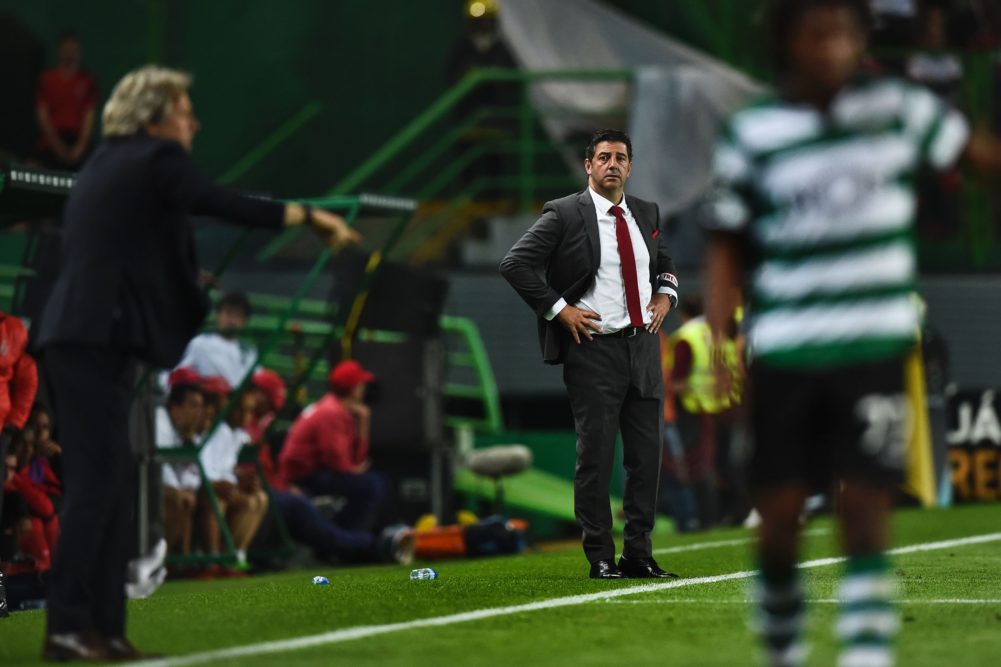
Benfica’s head coach Rui Vitoria (R) looks at Sporting’s head coach Jorge Jesus (L) during the Portuguese league football match Sporting CP vs SL Benfica at the Jose Alvalade stadium in Lisbon on April 22, 2017. / AFP PHOTO / PATRICIA DE MELO MOREIRA
As if that wasn’t enough, Benfica was 1st in the Primeira Liga until the second-last match, when they lost to Porto, who went on to be champions, with Porto scoring the winning goal in injury time. Benfica performed really over the course of the whole season, getting close enough to winning almost everything, but ended up losing pretty much everything.
In 2015/16, the crazy and most unexpected move happened. Jesus left Benfica and signed for their eternal rivals, Sporting Lisbon. That was shocking because everyone thought that Sporting didn’t really have the prestige or the financial capacity to sign such a reputed coach, but it really happened. Jorge Jesus went to Sporting Lisbon to earn €7 million per year. One of the main reasons behind this move is the fact that Jesus has been a Sporting Lisbon fan since he was a little boy, having even played for Sporting in the 70’s. His father was also a famous Sporting Lisbon supporter and player. So far at Sporting, Jorge Jesus has only won 1 Super Cup.
He’s always been famous and recognised for his teams’ exuberant playing style, but also for his controversial attitude, often teasing other managers, bragging about his wins and doing crazy things during the games, like screaming and making frenetic gestures to his players, entering the field when he is most excited, and arguing with the referees, among other things. His career speaks for itself and these unorthodox attitudes are only the reflex of a great football lover, perhaps with a big deal of egocentrism.
Tactical Analysis
One would perhaps think that comparing their ages, Jorge Jesus would opt for a more conservative playing style, whereas Vitória would have a more modern and offensively oriented approach. However, it really is the other way around.
Starting with the most recent Primeira Liga champion, Rui Vitória, we notice a rather conservative and cautious style. What we can see in Rui Vitória’s style of play is that he worries about the team’s defensive organisation and consistency, and makes a midfield that helps a lot with defensive tasks. However, one can also observe that Rui Vitória’s strategy is to start the game with a high level of pressure that lasts for the first 30-40 minutes of the game, and this is the period where Benfica display more offensive and daring behaviour, often scoring 1 or 2 goals and setting the game in their favour. Then, they reduce the level of pressure on the ball, the team narrows its lines and focuses mainly on their defensive security, trusting in the fast players that play on the wings to make quick offensive transitions and try and score more goals.
Thus, one can easily see that Rui Vitória’s Benfica is a completely different team in the 1st half and in the 2nd half. The 1st half’s creative and dynamic team gives way to a cautious and more defensively oriented team in the 2nd half. This type of play succeeds especially against the smaller teams, that usually concede goals in that first period where Benfica is more offensive and then are unable to score goals when Benfica gets defensive, due to the superior quality of the Benfica defenders. Also, when the opposition teams attempt to score against this defensive Benfica, usually expose themselves, allowing the quick and technically proficient Benfica forwards and wingers to score goals through quick offensive transitions.
Rui Vitória himself has stated that it is by winning against the small teams that a club becomes champion and when answering criticism about Benfica’s unattractive football, he clearly stated that winning is his goal. So far, it has definitely been working!
Jorge Jesus is exactly the opposite of Rui Vitória when it comes to the tactical approach of his teams and their behaviour during the game. Jesus’ defensive approach is known to be that of ‘attack is the best defence’ and Jesus has always put that into practice. Since the days when he coached minor first-tier clubs, it was evident and surprising how well his teams played and the dynamics and offensive proclivity of their football. In his first season at Sporting Lisbon (2015/16), the Sporting Lisbon supporters were crazy with the quality of the team’s play. The same happened at Benfica.
Sporting Lisbon’s defensive line is always really high up the field while they’re attacking, helping the team’s offensive manoeuvres and leading to an asphyxiating pressure on the ball when the team loses it. The full-backs are more like “second wingers”, always being involved in the team’s offensive play and that is why Jorge Jesus often adapts wingers to the full-back position (for example Fábio Coentrão), as he requires his full-backs to be offensively active and productive, almost as if they were true wingers.
In the midfield, Jesus’ Sporting Lisbon is supported by the presence of competent and flawless centre-midfielders that form the spine of Sporting Lisbon’s football. When he was st Benfica, we saw the likes of Javi García, Matic, and Enzo Pérez playing this part. At Sporting Lisbon, this role has been given almost exclusively to Adrien and William Carvalho.
The wingers are necessarily technically gifted and quick, as they also play a crucial part in the team’s offensive play. They are trusted with the function of taking the ball as close as possible to the opposite goal but their function is also to play near the centre, as Jorge Jesus likes, with quick and exuberant combinations in the middle that often lead to goals. João Mário is a good example of a winger playing near the centre, as he was originally a centre-midfielder but Jorge Jesus has adapted him to the position of winger, and he’s played the aforementioned part perfectly.
Given this offensive style of play, the second forward, meaning the forward that plays just behind the striker, is also a key element for the Jorge Jesus’ tactical system. Being the player whose role and positioning is less ‘established’ or predictable, he is the element in this 4-4-2 system that has to play in-between the opposition midfield and defensive lines, seeking the ball and making combinations with the wingers, the centre-midfielders and the striker. He is the connecting point between midfield and attack, and also has the mission of getting to finishing areas to score goals. In Sporting Lisbon, we have seen players like Bryan Ruiz, Alan Ruiz, Daniel Podence or Teo Gutiérrez playing this part.
Jorge Jesus usually prefers a less mobile striker, one that focuses on being where he must to place the ball inside the goal. He got the best out of Óscar Cardozo and Jonas at Benfica, for example, and did the same with Islam Slimani and Bas Dost at Sporting Lisbon. All of these players have been some of the top scorers in the Portuguese Primeira Liga in for the last few seasons, and last season Bas Dost was very close to winning the prize of the top scorer in Europe, with his 34 goals, only 3 less than Lionel Messi’s tally.
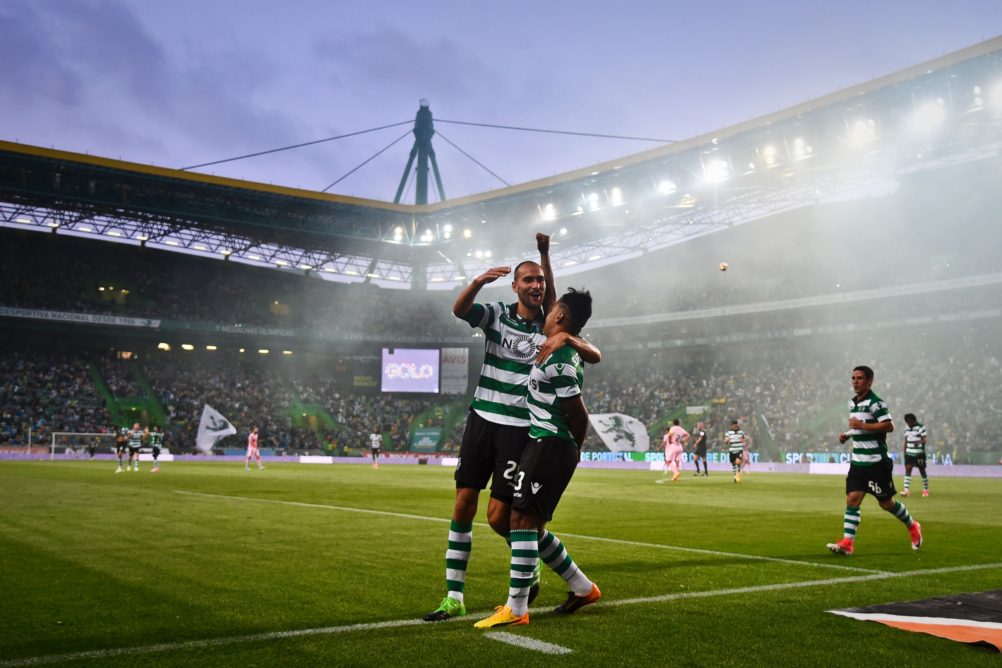
Sporting’s Brazilian forward Matheus Pereira (R) celebrates with his teammate Sporting’s Dutch forward Bas Dost (L) after scoring during the Portuguese league football match Sporting CP vs GD Chaves at the Jose Alvalade stadium in Lisbon on May 21, 2017. / AFP PHOTO / PATRICIA DE MELO MOREIRA
To sum up, while Rui Vitória prefers a more conservative and cautious approach, focusing on the defensive efficacy of his teams, thus granting that he won’t concede (almost) any goals, Jorge Jesus is a fan of a more lively and playing style, highlighting the offensive processes of the game, placing every player in the opposition’s midfield, designing a high-pressure and irreverently offensive team. He firmly believes that more his team scores the better, and also that if his team doesn’t let the opposition one construct their game, it is highly unlikely that his team will concede many goals.
Two different approaches by two different but equally intelligent and determined coaches that have brought life and suspense to Portuguese football.
The Men
So far I’ve been (naturally) focusing on Vitória and Jesus’ skills as coaches, as it is perhaps the main question when we analyse a football coach. Nevertheless, football has a very important human dimension, because all players and coaches are humans and therefore every one of them has their own peculiarities and psychological traits that primarily influences them.
I believe that it is this human dimension that makes Jesus and Vitória such different coaches, more than their different tactical approaches.
Jorge Jesus seldom loses a chance to be controversial, to tease his adversaries, to highlight his own qualities. Now, when he has a good and winning team, everything contributes positively to it. If he provokes a rival team and beats them 3-0, then that provocation is a sign of geniality and confidence. When he shouts heavily at his players during a match, and sometimes even enters the field doing it, and ends up winning all the time, then people will think he was tough but he was right. However, when things don’t go so well, like in 2010/11 in Benfica or 2016/17 in Sporting Lisbon, people, and even his team’s supporters, will only find him ridiculous and undesirable. Last season, when Sporting Lisbon almost beat Real Madrid in the group stage of the Champions League, Jorge Jesus, in a press conference, stated that that amazing performance was due to the fact that he was the best coach in Portugal and that his teams were always fantastic, completely obliterating the crucial contribution from the whole squad that played in that match.
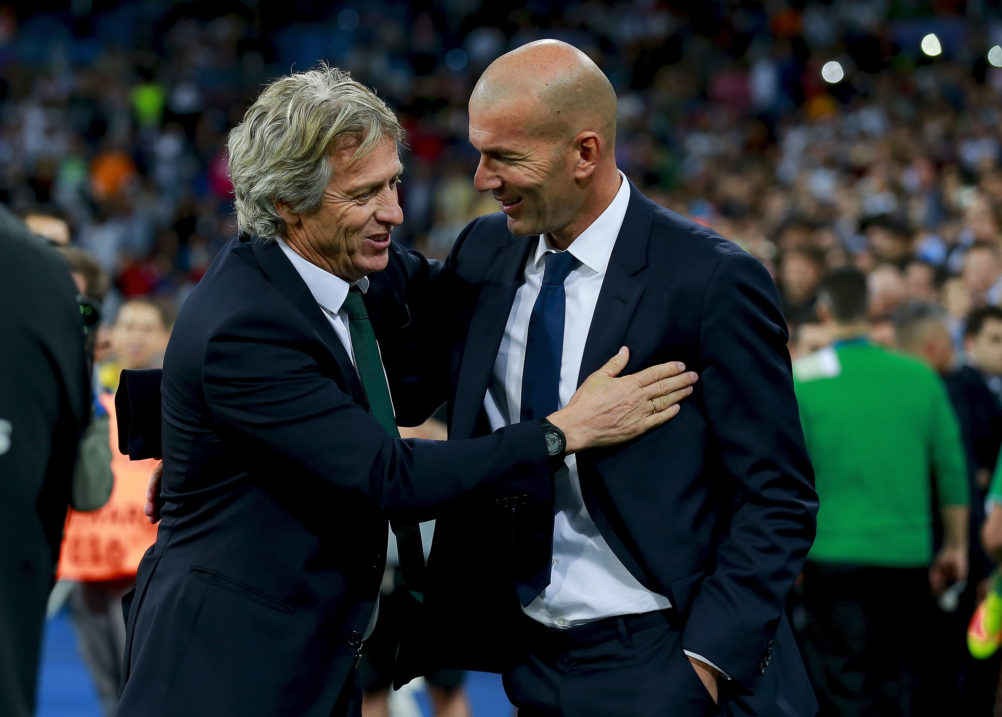
Coach Jorge Jesus (L) of Sporting CP hugs coach Zinedine Zidane (R) of Real Madrid CFduring the UEFA Champions League group stage match between Real Madrid CF and Sporting Clube de Portugal at Santiago Bernabeu stadium on September 14, 2016 in Madrid, Spain. (Photo by Gonzalo Arroyo Moreno/Getty Images)
Obviously, you can only shine against a team like Real Madrid if you have really good players and Jorge Jesus didn’t take that into consideration. Curiously, not long after that, Sporting Lisbon entered a spiral of defeats in the Primeira Liga, and that team which once had been the main candidate to win the title turned into a team that was off the pace by January, when Sporting occupied 4th place in the Primeira Liga for some weeks, before ultimately recovering to get to 3rd place.
Rui Vitória is, to my mind, positively very different from Jesus in that respect. Since the beginning everyone doubted is capacity to coach a team like Benfica, especially after losing 0-3 against Jesus’ Sporting Lisbon in their own stadium, he always stated that the work was being done well and that in the end Benfica’s fans would be very happy. Surprisingly, it really happened, and in only two seasons at Benfica, Rui Vitória has already won almost everything there is to win and done very well in the European competitions. Also, Rui Vitória has faced several periods in which many key-players of Benfica’s squad were injured for a long time and he had to resort to players no one thought would be good enough to win the title, players like Ederson Moraes, Lindelof or Renato Sanches, and yet all of them succeeded. Rui Vitória has never reacted to provocation from others (especially from Jorge Jesus) and has always been able to motivate his players, leading modest squads through a winning path.
Conclusion
This article focused on two coaches that are probably two of the best Portuguese coaches. I tried to highlight their way of playing and of thinking the game, as well as their human dimension.
I think an attentive fan can draw the obvious conclusion: Jorge Jesus is a tactical genius, who understands the game like very few do, but that somewhat lacks in the human dimension that is so important and this difficulty in motivating his players during some periods of the season has cost him some titles. Rui Vitória is not as genial as Jesus when it comes to tactics, preferring more a cautious way of playing. He often uses simpler offensive processes and often approaches the game in a very defensive way. In fact, Rui Vitória prefers winning for 1-0 and taking no risks than trying to win 4-0, but endangering the defensive efficiency of the team. Nevertheless, despite not being so fantastic in certain aspects of the game, Vitória is great at motivating his players, in leading them through a long and difficult season, and that has granted him a huge success so far.
Two great coaches in two great teams. It is obvious that Portugal is going to witness a hell of a 2017/18 season!
- Scout Report: Gonçalo Paciência | Eintracht’s exquisite forward - August 17, 2018
- Scout Report: Diogo Gonçalves | Benfica’s tricky winger - August 15, 2018
- Scout Report: Diogo Dalot | Manchester United’s New Full-Back - August 6, 2018






















































